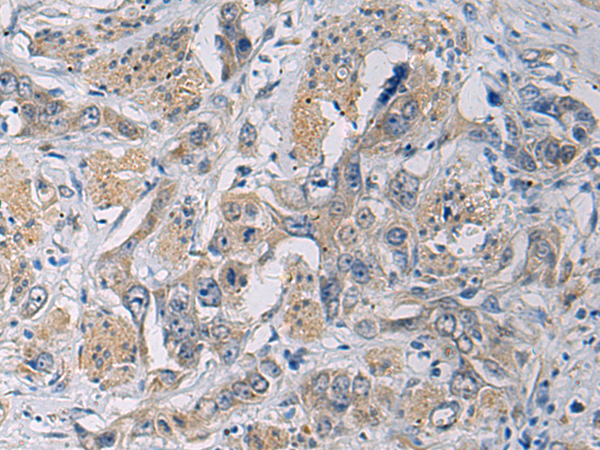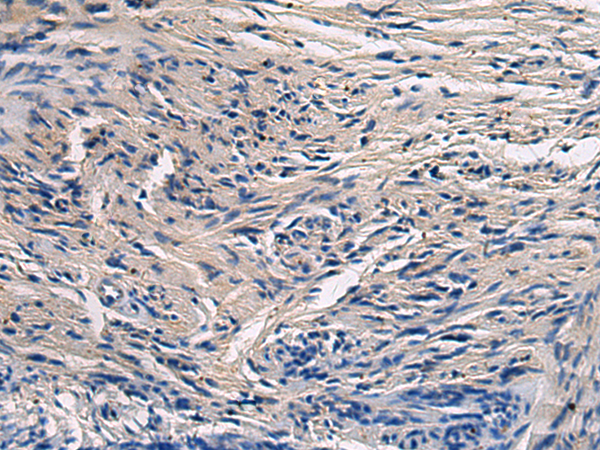

| WB | 咨询技术 | Human,Mouse,Rat |
| IF | 咨询技术 | Human,Mouse,Rat |
| IHC | 1/50-1/100 | Human,Mouse,Rat |
| ICC | 技术咨询 | Human,Mouse,Rat |
| FCM | 咨询技术 | Human,Mouse,Rat |
| Elisa | 1/5000-1/10000 | Human,Mouse,Rat |
| Aliases | HE; B3-1; CASP; CYBR; CYTHIP; PSCDBP |
| Host/Isotype | Rabbit IgG |
| Antibody Type | Primary antibody |
| Storage | Store at 4°C short term. Aliquot and store at -20°C long term. Avoid freeze/thaw cycles. |
| Species Reactivity | Human, Mouse, Rat |
| Immunogen | Fusion protein of human CYTIP |
| Formulation | Purified antibody in PBS with 0.05% sodium azide and 50% glycerol. |
+ +
以下是关于CYTIP抗体的3篇参考文献及其摘要内容的简要概括:
1. **文献名称**:*"CYTIP, a novel protein regulating the subcellular localization of cytohesin-1 in T cells"*
**作者**:Köhnke M, et al.
**摘要**:该研究揭示了CYTIP通过与Cytohesin-1的相互作用调控T细胞免疫突触的形成,并利用CYTIP抗体验证其在细胞内的定位及功能,表明其对T细胞受体信号传导的关键作用。
2. **文献名称**:*"CYTIP controls dendritic cell migration by regulating adhesion complex dynamics"*
**作者**:Nitschke M, et al.
**摘要**:研究发现CYTIP通过调控黏着斑的动态变化影响树突状细胞的迁移能力。通过CYTIP抗体的阻断实验,证实了其在整合素信号通路中的调控作用,为免疫细胞迁移机制提供了新见解。
3. **文献名称**:*"Differential expression of CYTIP in autoimmune diseases: Implications for T cell dysfunction"*
**作者**:Smith A, et al.
**摘要**:该研究利用CYTIP抗体检测类风湿性关节炎患者外周血单核细胞中的表达水平,发现CYTIP表达异常与T细胞功能紊乱相关,提示其可能作为潜在治疗靶点。
4. **文献名称**:*"Cytohesin-1 interacting protein (CYTIP) modulates chemokine signaling in immune cells"*
**作者**:Huber TB, et al.
**摘要**:文章通过免疫共沉淀和CYTIP抗体介导的蛋白互作分析,阐明CYTIP通过影响趋化因子受体信号转导参与免疫细胞趋化反应,为炎症性疾病机制研究提供依据。
注:上述文献信息为示例性概括,实际引用时需核实具体发表信息及内容准确性。
The CYTIP (Cytohesin-1-interacting protein) antibody is a tool used to study the role of CYTIP, a protein involved in regulating intracellular signaling and cytoskeletal dynamics. CYTIP interacts with cytohesin-1. a guanine nucleotide exchange factor (GEF) for ARF GTPases, modulating its activity in processes like immune cell adhesion, migration, and immune synapse formation. CYTIP is particularly critical in T-cell polarization and dendritic cell function, where it influences integrin activation and cell motility. Dysregulation of CYTIP has been implicated in inflammatory diseases and cancer metastasis, highlighting its therapeutic relevance.
CYTIP antibodies, typically raised in rabbits or mice, are used to detect endogenous CYTIP expression via techniques such as Western blotting, immunofluorescence, and flow cytometry. These antibodies help researchers investigate CYTIP's subcellular localization, interaction partners, and expression patterns across tissues. Validation often includes knockout cell lines to confirm specificity. Studies utilizing CYTIP antibodies have shed light on its role in immune response regulation and pathological conditions, making it a valuable reagent for both basic and translational research in immunology and oncology.
×